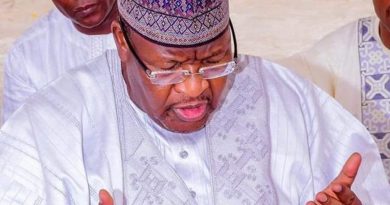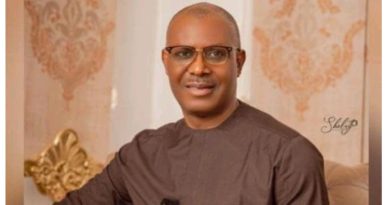SOCIAL MEDIA: Only The Guilty Are Afraid—By Emmanuel Onwubiko
President Muhammadu Buhari through his Information and Culture Affairs’ Cabinet level Minister Alhaji Lai Mohammed has spent the better part of the last five years since getting into office in 2015, to Campaign against access to social media.
The government of President Buhari has carried on these convert and overt fights against media freedoms as if to say there is an agenda to re-introduce the same sets of anti-media freedom military decrees that the then Major General Muhammadu Buhari imposed on Nigerians when he was a military despot in the Mid 1980’s.
That time it was called Decree 4 of 1984 under which several Journalists were detained for simply doing their work as media practitioners. In 1984, major General Muhammadu Buhari as he then was, in his capacity as a military dictator, promulgated decree 4 for (Public officers protection against false publications.) Two journalists of The Guardian Newpaper, Nduka Irabor and Tunde Tompson, were thrown into the dungeons for running foul of this draconian decree.
Fast forward to 2015 when the former military dictator transmutated into a civilian president after he reportedly won the presidential election under the aegis of an amalgam of several political groupings known as all progressives congress, the president has remained very passionate to return to the bad old days of massive repression and oppression of the mass media.
This time around, his misguided agitation against free press is broadened to include a coordinated attack against access to the social media which is very popular amongst the youngest members of the Nigerian population.
In 2020, the Nigeria’s telecommunications subscriber base is said to have reached 189, 282, 796 million, according to statistics released by the Nigerian Communications Commission (NCC). Going by this statiscal data, it is not illogical to argue that over one hundred million Nigerians have access to the social media just as the majority of these subscribers are persons within the international benchmark of the age bracket classified as youths.
Relatedly, in 2020, the estimated youth unemployment rate in Nigeria was almost 14.2 percent. According to the source, the data are estimates from the International Labour Organization, an agency of the United Nations developing policies to set labour standards (www.standard.com).
On May 4th 2020, one of the most reputable global television stations – Aljazeera reported that forty percent of people in Nigeria live in poverty, figures published by the statistics office which highlighted the low levels of wealth in a country that has Africa’s biggest economy. The National Bureau of Statistics (NBS), in a report about poverty and inequality from September 2018 to October 2019, said 40 percent of people in the continent’s most populous country lived below its poverty line of 137, 430 Naira ($381. 75USD) a year, so reports Aljazeera TV.
If one should then put side by side these ugly scenarios of poverty and unemployment rate in Nigeria which in all possibilities, affect the younger members of the Nigerian population, it is not farfetched to hazard a guess that the morbid fear by government of allowing Nigerians to have access to the social media may not be unconnected to the harsh reality of lack of good governance which unleashes poor standards of living and these are the necessary evils that precipitate social upheavals in any given society. Aristotle, one of the fathers of philosophy was credited as warning governments to be wary of allowing mass poverty as that is the necessary attribute of mass revolution and/or crime.
This is then the major fear of the current Federal government of Nigeria from the look of things going by the extreme fixation with the way Nigerians have access to the media of mass communication and importantly the social media.
In their bid to win more disciples to canvass the muzzling of the media, the central government have recruited governors of Northern States and traditional rulers to begin the sinister Campaigns against media freedoms because they say allowing Nigerians to enjoy freedoms of expression may amount to seeking regime change.
These reactionary elements in the Muhammadu Buhari’s administration have gone ahead to mix up politics with such a critical constitutional issue as freedom of mass media and social media by introducing the deceptive political angle that those who use social media are working to change the President of Nigeria.
Nothing can be farther from the truth. Let us look at the position espoused by them.
The Northern States Governors Forum (NSGF) including traditional rulers stakeholders have called for the regulation of social media in Nigeria.
In a communiqué issued in Kaduna on Monday at the end of their meeting with traditional rulers and other Political office holders from the region, the forum said the new media would have to be regulated in order to halt the dangers of spreading fake news.
Reading the communiqué, on Monday, Chairman of the Northern States Governors Forum, and Plateau State Governor, Simon Bako Lalong, said the meeting was in view of recent security challenges, which enveloped the country.
“The meeting took note of the devastating effect of the uncontrolled social media in spreading fake news.
“Therefore, calls for major control mechanisms and censorship of social media practice in Nigeria,” parts of the communiqué read.
The meeting was attended by His Excellency, the Senate President, of the Federal Republic, the Honourable Deputy Speaker and other members of the National Assembly, the Chief of Staff to the President, the Minister of Federal Capital Territory, the Minister of Information and Culture, the Inspector General of Police, Principal Officers of the National Assembly, Chairmen of the Northern States Traditional Rulers Council led by His Eminence the Sultan of Sokoto.
These persons are wrong to call for censorship of the social media which is contrary to section 39 of the constitution on Right to freedom of expression and section 22 which makes the media as the conscience of the nation. The then leader of the World’s two billion membership Roman Catholic Church in 2005 Pope John Paul 11 did categorically stated the gains and pains of the media and ended by affirming that the media does a lot of good than harm to the society.
A commentator had presented the Pope’s affirmations thus: “Another amazingly-succinct and insightful pastoral letter has been released earlier this month by Pope John Paul II.”
His letter The Rapid Development, written to those responsible for communications, exhorts Catholics to not be afraid of the communications media, but to use the media to promote the truth.
The Church is not only called upon to use the mass media to spread the Gospel but, today more than ever, to integrate the message of salvation into the “new culture” that these powerful means of communication create and amplify. It tells us that the use of the techniques and the technologies of contemporary communications is an integral part of its mission in the third millennium.”
What does this mean for us? We must work towards finding a way to integrate communications media into our Catholic faith in such a way as to effectively evangelize and promote the truth, while remaining ‘removed’ from the world and living a ‘balanced’ life. Too little use of communications media can be a hindrance to advancement of Jesus’ Gospel message; too much use can ruin a person’s life!
There is most certainly a difference between speaking to a person directly, face-to-face, and indirectly, as through text or pictures on a website, on TV or on the radio, and this fact must be respected. Communications media can help us, but it is by no means a complete solution to evangelization and education. One should not become caught up in the media (watching TV, blogging, writing, reading news, etc.); nor can one ignore it.
John Paul II is spot-on in his analysis of the current situation in the U.S. and many other media-saturated countries:
“The communications media have acquired such importance as to be the principal means of guidance and inspiration for many people in their personal, familial, and social behavior. We are dealing with a complex problem, because the culture itself, prescinding from its content, arises from the very existence of new ways to communicate with hitherto unknown techniques and vocabulary.”
This situation can be helpful or harmful: Because of the pervasiveness of the media, Catholics (or anyone else using the media) can quickly spread large amounts of information among many thousands—even millions—of people. Conversely, forces opposed to the Catholic Church are easily able to spread blatant misinformation, lies, and non-truths.
Catholics of the 3rd Millenium (myself included) must find inroads—through blogging, websites, video, audio, radio, television, telecommunications, and other forms of media—by which we can promulgate the Catholic faith. For centuries, our Church has continued to adopt new ways of bringing people closer to Jesus and ultimate fulfillment of Heaven, and the Church will continue to evolve to bring Jesus to millions more.
Another interesting aspect of this letter is the fact that Pope John Paul II, who some in the mainstream communications media have deemed as unfit for the Papacy, is continuing his well-written, sound pastoral letters. In my opinion, the Pope is not the one who is in need of retirement; it is the writers who accuse him of being ‘too old’. It is obvious from all the Pope continues to do that he is a blessing upon our Church and continues to share a profound, inspired wisdom. These are deeply philosophical truths about the positives of the social media as adumbrated by the then leader of the Catholic Church who after his physical demise was pronounced a saint by the Church.
Coming to the fears about the spread if fake, it is not out of place to assert that the social media owners are doing so very much to combat fake news. So what is Facebook for instance doing to Combat Fake News?
A writer who wrote on measures taken by Facebook states thus: “This month, in my Scientific American column, I wrote about the rise of fake news stories: Bogus stories, posted on no-name Web sites, intended to generate ad income (and perhaps to influence the presidential election).
“At first, Facebook CEO Mark Zuckerberg downplayed the significance of the fake-news tsunami.
“But as the backlash continued, Facebook soon rolled out new tools to combat the spread of fake news. As a spokesman puts it, “We cannot become arbiters of truth ourselves.”
Instead, the new tools take four approaches, which Facebook intends to study and enhance over time.
First: If you tap the V button at the top right of a post and then choose “Report this post,” you’ll see a new option called “It’s a fake news story.” On the next screen, you’ll have a choice of options, including “Mark this post as fake news.” (Other options include “Message Chris Robin” [or whomever posted the story] to let them know they fell for it.)
Second: If enough people flag a story as fake, it will be sent to a fact-checking organization like Snopes.com or PolitiFact. And if the outfit determines that yes, the story is bogus, it will appear on Facebook with a red banner that says, “Disputed by Third-Party Fact Checkers.” That banner will include a link to the fact checkers’ article explaining why the story is false. (If you try to share it, you’ll see a similar message.)
In other words, Facebook is being careful to avoid outright censorship. The stories still appear, but with flags that identify them as phony. (Those stories may appear lower in your News Feed, and can’t be promoted or made into ads.)
Third: Facebook will employ software to help identify fake stories. For example, Facebook has learned that when lots of people read a certain article but then don’t share it, it’s often because the story is phony.
Fourth: Facebook is trying to shut down the financial incentive for fakers. Its engineers have eliminated the ability for the fakers to create Web sites that impersonate actual news sites, for example. And the company will analyze sites that draw ad dollars from Facebook traffic, and will cut them off if they’re in the business of fake-news fraud.
As Facebook has pointed out, there can be a fine line between “fake news” and satire, rumor, editorial and true-but-missing-context stories. The company’s four steps strike me as impressively fair and thoughtful. They aim to help readers sort out fact from fiction, without actually stifling anybody’s opinion.”
The attempt therefore by government to censor access to media is illegal, unconstitutional, primitive and must be resisted by all rational human persons. The government officials have unleashed mass poverty through poor governance and corruption, so they are afraid of the youths asking them to account for this mismanagement.
Emmanuel Onwubiko is Head, HUMAN RIGHTS WRITERS ASSOCIATION OF NIGERIA (HURIWA). Blogs@www.huriwanigeria.com, www.huriwa@blogspot.com; www.thenigerianinsideernew.com.
(TSN)




